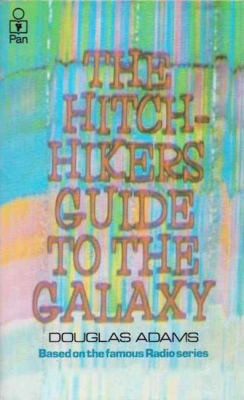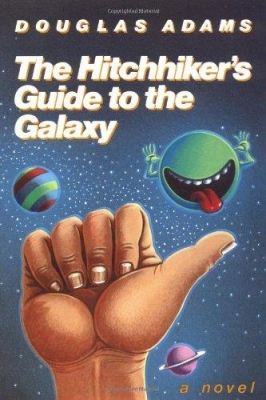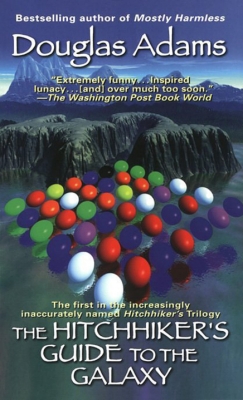The Golden Age of Science Fiction: The Hitchhikers’ Guide to the Galaxy, by Douglas Adams
The Ditmar Awards are named for Australian fan Martin James Ditmar Jenssen. Founded in 1969 as an award to be given by the Australian National Convention, during a discussion about the name for the award, Jenssen offered to pay for the award if it were named the Ditmar. His name was accepted and he wound up paying for the award for more years than he had planned. Ditmar would eventually win the Ditmar Award for best fan artist twice, once in 2002 and again in 2010. Primarily an Australian Award, for most years from 1969 to 1989, an award was presented for International Fiction. The International Fiction Award was one of the Ditmar’s original awards and the first one was won by Thomas M. Disch for Camp Concentration. In 1980, the Ditmar Award for International Fiction was presented to Douglas Adams for The Hitchhiker’s Guide to the Galaxy at Swancon 5, held in Perth. The last time the award was presented was in 1989 to Orson Scott Card for the novel Seventh Son. On two occasions, in 1971 and 1984, no award was presented.
I bought my first copy of The Hitchhiker’s Guide to the Galaxy at a small independent bookstore that, amazingly enough, still exists forty years later. When I bought the book, I had already heard the radio series and knew what to expect. Of course, the novel and the radio series are in no way the same thing. Adams was able to flesh things out a little more in the book and could add descriptive passages that weren’t possible in the radio show. In addition, jokes that had been in the radio series were dropped if Adams felt they didn’t quite work.
The novel was based on the first four fits (episodes) of the radio series, which originally ran for six fits. In part because the novel ends before the radio series did, it has a slightly unfinished feel to it. While the first run of the radio show ends with Adams’s characters on a prehistoric Earth, that doesn’t happen until the end of the second novel in the series, The Restaurant at the End of the Universe, which loosely follows the last two fits. At the end of the fourth fit, Arthur Dent, Ford Prefect, Trillian, and Zaphod Beeblebrox are blown into the future when a time machine they are hiding behind explodes after taking fire from two policemen, Bang Bang and Shooty. In the novel, the two policemen died after Marvin the Android caused their life support system to commit suicide. In the radio show, they are blown to the titular restaurant while at the end of the novel Zaphod casually suggests they go to the restaurant for a bite to eat.
The novel is clever and witty, filled with satire of science fiction as well as the public perception of what science fiction is, which allowed it to be accessible to a broader audience, although knowledge of science fiction allows Adams’s humor to land more effectively. When I first listened to the radio series and first read the book in 1979, I would have been shocked at the thought that nearly four decades later my daughter would be reading The Hitchhiker’s Guide to the Galaxy as assigned reading in a high school class on science fiction. Since in 1979 that last sentence would have contained three impossibilities, I only need to come up with three more impossibilities in order to eat at Milliway’s.
The competition for the Best International Fiction Ditmar included Pier Anthony’s third Xanth novel Castle Roogna, Anne McCaffrey’s Dragondrums, Peter Dickinson’s The Flight of Dragons and John Varley’s Titan.
 Steven H Silver is a sixteen-time Hugo Award nominee and was the publisher of the Hugo-nominated fanzine Argentus as well as the editor and publisher of ISFiC Press for 8 years. He has also edited books for DAW, NESFA Press, and ZNB. He began publishing short fiction in 2008 and his most recently published story is “Webinar: Web Sites” in The Tangled Web. His most recent anthology, Alternate Peace was published in June. Steven has chaired the first Midwest Construction, Windycon three times, and the SFWA Nebula Conference 6 times, as well as serving as the Event Coordinator for SFWA. He was programming chair for Chicon 2000 and Vice Chair of Chicon 7.
Steven H Silver is a sixteen-time Hugo Award nominee and was the publisher of the Hugo-nominated fanzine Argentus as well as the editor and publisher of ISFiC Press for 8 years. He has also edited books for DAW, NESFA Press, and ZNB. He began publishing short fiction in 2008 and his most recently published story is “Webinar: Web Sites” in The Tangled Web. His most recent anthology, Alternate Peace was published in June. Steven has chaired the first Midwest Construction, Windycon three times, and the SFWA Nebula Conference 6 times, as well as serving as the Event Coordinator for SFWA. He was programming chair for Chicon 2000 and Vice Chair of Chicon 7.


